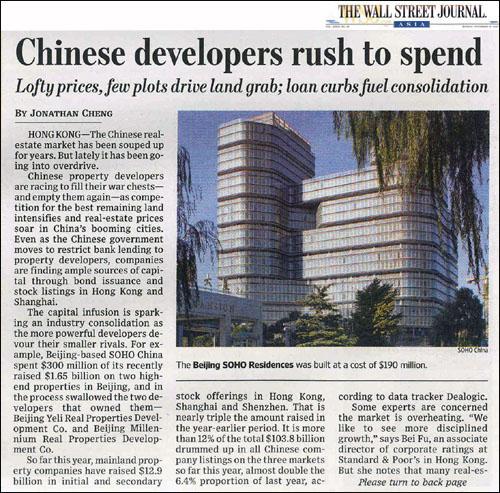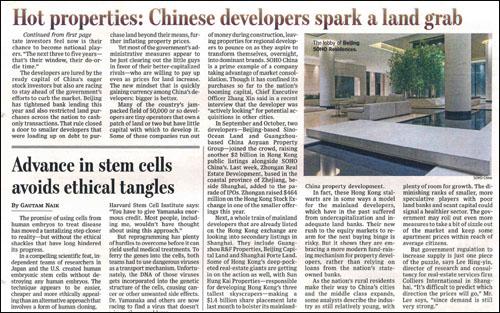

--- Lofty prices, few plots drive land grab; loan curbs fuel consolidation
By Jonathan Cheng
HONG KONG -- The Chinese real-estate market has been souped up for years. But lately it has been going into overdrive.
Chinese property developers are racing to fill their war chests -- and empty them again -- as competition for the best remaining land intensifies and real-estate prices soar in China s booming cities. Even as the Chinese government moves to restrict bank lending to property developers, companies are finding ample sources of capital through bond issuance and stock listings in Hong Kong and Shanghai.
The capital infusion is sparking an industry consolidation as the more powerful developers devour their smaller rivals. For example, Beijing-based SOHO China spent $300 million of its recently raised $1.65 billion on two high-end properties in Beijing, and in the process swallowed the two developers that owned them -- Beijing Yeli Real Properties Development Co. and Beijing Millennium Real Properties Development Co.
So far this year, mainland property companies have raised $12.9 billion in initial and secondary stock offerings in Hong Kong, Shanghai and Shenzhen. That is nearly triple the amount raised in the year-earlier period. It is more than 12% of the total $103.8 billion drummed up in all Chinese company listings on the three markets so far this year, almost double the 6.4% proportion of last year, according to data tracker Dealogic.
Some experts are concerned the market is overheating. "We like to see more disciplined growth," says Bei Fu, an associate director of corporate ratings at Standard & Poor s in Hong Kong. But she notes that many real-estate investors feel now is their chance to become national players. "The next three to five years -- that s their window, their do-or-die time."
The developers are lured by the ready capital of China s eager stock investors but also are racing to stay ahead of the government s efforts to curb the market. Beijing has tightened bank lending this year and also restricted land purchases across the nation to cash-only transactions. That rule closed a door to smaller developers that were loading up on debt to purchase land beyond their means, further inflating property prices.
Yet most of the government s administrative measures appear to be just clearing out the little guys in favor of their better-capitalized rivals -- who are willing to pay up even as prices for land increase. The new mindset that is quickly gaining currency among China s developers: bigger is better.
Many of the country s jam-packed field of 50,000 or so developers are tiny operators that own a patch of land or two but have little capital with which to develop it. Some of these companies run out of money during construction, leaving properties for regional developers to pounce on as they aspire to transform themselves, overnight, into dominant brands. SOHO China is a prime example of a company taking advantage of market consolidation. Though it has confined its purchases so far to the nation s booming capital, Chief Executive Officer Zhang Xin said in a recent interview that the developer was "actively looking" for potential acquisitions in other cities.
In September and October, two developers -- Beijing-based Sino-Ocean Land and Guangzhou-based China Aoyuan Property Group -- joined the crowd, raising another $2 billion in Hong Kong public listings alongside SOHO China s. Last week, Zhongan Real Estate Development, based in the coastal province of Zhejiang, beside Shanghai, added to the parade of IPOs. Zhongan raised $464 million on the Hong Kong Stock Exchange in one of the smaller offerings this year.
Next, a whole train of mainland developers that are already listed on the Hong Kong exchange are looking into secondary listings in Shanghai. They include Guangzhou R&F Properties, Beijing Capital Land and Shanghai Forte Land. Some of Hong Kong s deep-pocketed real-estate giants are getting in on the action as well, with Sun Hung Kai Properties -- responsible for developing Hong Kong s three tallest skyscrapers -- making a $1.4 billion share placement late last month to bolster its mainland-China property development.
In fact, these Hong Kong stalwarts are in some ways a model for the mainland developers, which have in the past suffered from undercapitalization and inadequate land banks. Their new rush to the equity markets to rearm for the next buying binge is risky. But it shows they are embracing a more modern fund-raising mechanism for property developers, rather than relying on loans from the nation s state-owned banks.
As the nation s rural residents make their way to China s cities and the middle class expands, some analysts describe the industry as still relatively young, with plenty of room for growth. The diminishing ranks of smaller, more speculative players with poor land banks and scant capital could signal a healthier sector. The government may roll out even more measures to take a bit of sizzle out of the market and keep some apartment prices within reach of average citizens.
But government regulation to increase supply is just one piece of the puzzle, says Lee Hing-yin, director of research and consultancy for real-estate services firm Colliers International in Shanghai. "It s difficult to predict which direction the prices will go," Mr. Lee says, "since demand is still very strong."
Related News
Photos
More>>trade
market
- Voyage de Luxe - The Commune by the Great Wall Kempinski: la demesure d'un hotel
- South China Morning Post - Soho China acquires building in Shanghai
- The Wall Street Journal Asia - Morgan Stanley sells Shanghai tower to SOHO
- SOHO China - Pan Shiyi: Superb location and design are critical attributes
- South China Morning Post - Soho China chief feels secure in the spotlight Pan





